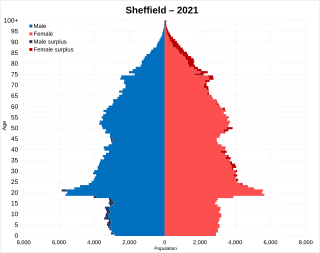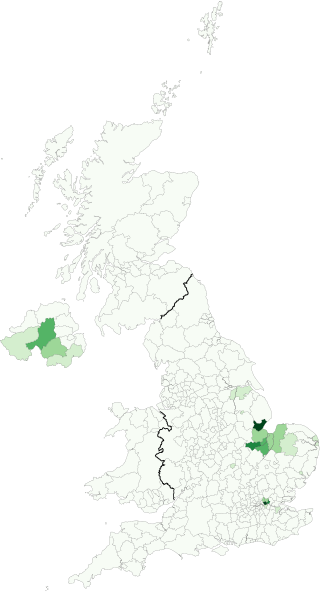
The South African diaspora consists of South African emigrants and their descendants living outside South Africa. The largest concentrations of South African emigrants are to be found in the United Kingdom, Australia, the United States and the United Arab Emirates. At the time of the 2021 United Kingdom census, 217,180 residents of England and Wales were born in South Africa. In Australia, there were 189,207 South African-born people living in the country at the moment of the 2021 Census. The 2021 American Community Survey identified 123,461 South African-born residents of the country.

The latest (2022) population estimate for the City of Sheffield is 566,242 residents. This represents an increase of about 17,000 people since the last census in 2011.
Ghanaians in the United Kingdom encompass both Ghana-born immigrants and their descendants living in the United Kingdom. Immigration to the UK accelerated following the independence of Ghana from the British Empire in 1957, with most British Ghanaians having migrated to the UK between the 1960s to the 1980s owing to poor economic conditions at home.
The historical immigration to Great Britain concerns the movement of people, cultural and ethnic groups to the British Isles before Irish independence in 1922. Immigration after Irish independence is dealt with by the article Immigration to the United Kingdom since Irish independence.
British Nigerians have formed long-established communities in London, Liverpool and other industrial cities. Many Nigerians and their British-born descendants in Britain live in South London, and they are one of the larger immigrant groups in the country.
Germans in the United Kingdom form one of the largest minority groups in the country. Today, there are many Germans living in the United Kingdom, and many Britons or German British have German ancestry, including the British royal family. While those born in Germany constitute one of the UK's largest foreign-born groups, many are British nationals, rather than German nationals, who were born in Germany to British military personnel based there.

French migration to the United Kingdom is a phenomenon that has occurred at various points in history. The Norman Conquest of England by William the Conqueror in 1066 resulted in the arrival of Normans, while in the 16th and 17th centuries Protestant Huguenots fled religious persecution to East London. Other waves are associated with monasticism, particularly post-conquest Benedictines and Cistercians, aristocracy fleeing the French Revolution, expulsion of religious orders by Third Republic France, and current expats.

Spaniards in the United Kingdom are people of Spanish descent resident in Britain. They may be British citizens or non-citizen immigrants.
Koreans in the United Kingdom include Korean-born migrants to the United Kingdom and their British-born descendants tracing ancestries from North Korea and South Korea.
Kenyan migration to the United Kingdom has been occurring for many decades. As a result, many people in the UK were born in Kenya, or have Kenyan ancestry. Many Kenyan people who migrated to the UK are of South Asian extraction.
Colombians in the United Kingdom or Colombian Britons include British citizens or residents who are of Colombian ancestry. According to the 2011 UK Census, the Colombian-born population of England was 25,016, Wales 166, Scotland 507 and Northern Ireland 72.

Romanians in the United Kingdom refers to Romanian immigrants in the United Kingdom, both citizens and non-citizens, along with British citizens of Romanian ancestry. The number of Romanian-born people resident in the UK has risen from 83,168 at the time of the 2011 United Kingdom census to 538,840 in England and Wales alone in 2021.

The Zimbabwean diaspora refers to the diaspora of immigrants from the nation of Zimbabwe and their descendants who now reside in other countries. The number of Zimbabweans living outside Zimbabwe varies significantly from 4 to 7 million people, though it is generally accepted at over 5 million people, some 30 per cent of all Zimbabweans. Varying degrees of assimilation and a high degree of interethnic marriages in the Zimbabwean diaspora communities makes determining exact figures difficult. The diaspora population is extremely diverse and consists of Shona people, Ndebele, white Zimbabweans, mixed-race people, Asians, Jewish people and other minority groups. The diaspora traces their origin to several waves of emigration, starting with the exodus that followed the 1965, unilateral declaration of independence in Rhodesia, but significantly since the sociopolitical crisis that began in 2000.
British Afghans are British citizens and non-citizen residents born in or with ancestors from, Afghanistan, part of worldwide Afghan diaspora. The Office for National Statistics (ONS) estimates that there were 79,000 people born in Afghanistan living in the UK in 2019.
Ethiopians in the United Kingdom are a national group that consist of Ethiopian immigrants to the United Kingdom as well as their descendants.
Algerians in the United Kingdom are residents of the UK with ancestry from Algeria. They include Algerian-born immigrants and their British-born descendants.

Lithuanians in the United Kingdom include individuals born in Lithuania who have migrated to the UK, among them Lithuanian citizens of Russian descent and Polish Lithuanian citizens, as well as their British-born descendants. The 2011 UK Census recorded 95,730 Lithuanian-born residents in England, 1,353 in Wales, 4,287 in Scotland, and 7,341 in Northern Ireland. The previous, 2001 UK Census, had recorded 4,363 Lithuanian-born residents. The Office for National Statistics estimates that 144,000 Lithuanian-born immigrants were resident in the UK in 2013.
Ivoirians in the United Kingdom or Ivorian British are one of the country's smallest African immigrant groups, consisting of no more than 10,000 individuals. The group includes people born in Côte d'Ivoire who have migrated to the United Kingdom, as well as their British-born descendants.
Sudanese in the United Kingdom including Sudanese-born immigrants to the UK and their British-born descendants are an extremely diverse national group, especially in terms of political and religious views. It is thought that the UK is home to the oldest Sudanese diaspora in the Western World, as well as one of the largest. Sudanese migrants to the UK have traditionally included professionals, business people and academics, and more recently have included asylum seekers fleeing Sudan's second civil war. Sudanese people live in many of the UK's largest cities and towns.
Zimbabwean Canadians are Canadian citizens of Zimbabwean descent or a Zimbabwe-born person who resides in Canada. According to the Canada 2016 Census there were 16,225 Canadian citizens who claimed Zimbabwean ancestry and 15,000 Zimbabwean citizens residing in the country at the moment of the census.






